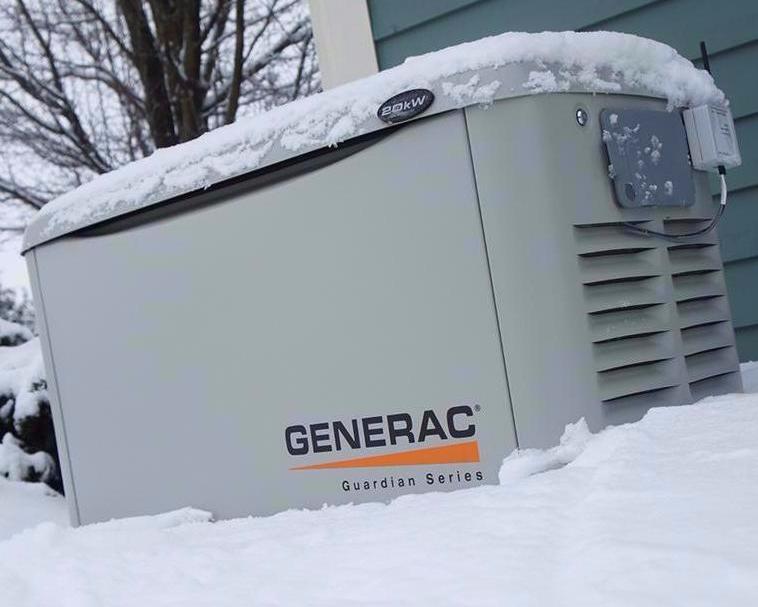Products
Services
Online Store
Other Resources

Is your home standby generator ready? If not, it’s time to prepare. Read to learn why preparing your generator is a must before winter and find seven tips.
A frigid winter holds the possibility of blizzards, ice storms and high wind gusts. These are dangerous, weather-related situations on their own, but if caught without power, it can be even more so.
Hypothermia and frostbite are both potential dangers during the cold winter months. Hypothermia can be a life-threatening emergency at even mildly cool temperatures. Frostbite is most common after prolonged exposure to the cold and can cause you or a family member to lose one of their digits or limbs.
During the winter, warming up inside is crucial to your general health. But to ensure your generator power will be there when you need it, you must prepare your standby or portable generator ahead of the coldest weather. When the power goes off, having a reliable standby generator means knowing your family will stay warm.
Before cold weather strikes, change the oil in your generator. In the instruction manual, you can find out how often your backup generator needs an oil change.
Still, waiting for a regular oil change? You’ll still want to consider changing your summer oil for a low-viscosity option that is more suitable for colder temperatures.
Standby generators typically have three filter types: oil, air and fuel filters. At the end of fall, you should clean or change the filters as appropriate before the temperatures drop too much.
If you’ve changed your generator filters in the last year and haven’t used them very often, you should clean them fine. However, if your generator sees heavy use or it’s been longer than a year, you’ll probably want to replace the generator filters to be safe.
Not all generators use batteries. But if yours is one of the models that do, you’ll want to take some time to charge it before winter arrives. If not, you could find a dead battery when the next power outage strikes, and that means being in the cold for hours or even days.
If the battery on your generator has been changed for a long time or is starting to look corroded, you may want to get a new one. A faulty battery could cause significant system failure, meaning your generator won’t work anymore.
You may already know that an empty gas tank is a corrosion risk. For this reason, you likely store your standby generator or portable generator with a full fuel tank.
However, fuel that’s sat too long can start to degrade. Degraded fuel won’t work correctly and can ruin your generator’s engine.
Using a fuel stabilizer can solve this issue. Read the label and pour an appropriate stabilizer into your fuel tank. This should help extend the usable life span of your fuel and protect your generator engine against related complications.
A home backup generator will usually have a dedicated area outside your home because it’s large and needs to be connected to your main power supply. A portable generator may be stored in your basement, garage or shed when not in use. Generators can be damaged by yard or basement flooding, so store them off the ground whenever possible.
These generators need a clear path to operate. Otherwise, you run the risk of fires, harmful contaminants in the air and other dangers. There shouldn’t be items near your generator, and even the grass should be kept low.
If there’s any dangerous debris at the end of fall (like leaves), clear it out so you can do it during a power outage in harsh winter weather.
Your generator runs best with regular maintenance. Preferably, you’ll schedule this once a year. You may not have to do certain things, like changing the oil and filters, if a generator service technician has already done them. If you do, be sure to ask what services were provided.
Once you’ve prepared your generator, be sure to test it. Although Generac generators are reliable and long-lasting, several things could go wrong. A faulty transfer switch or wiring could be to blame if it’s a new generator. The wiring or the system could have issues if it’s an older generator. If your backup generator doesn’t work and you aren’t sure why a generator service technician can help.
Do you need a new home standby generator before the winter storms strike? Or do you need annual maintenance to ensure optimal generator performance? One of our standby generator professionals is ready to answer any questions and help ensure you’re ready to face freezing temperatures with a reliable backup power source. Ontario’s leading Generac Generator installer is just a quick call away!

The #1 Authorized Generac Home Standby Generator Dealer in Ontario


© 2024 Platinum Electrical Contractors, All Rights Reserved
A member of our team will be in touch shortly to discuss how we can help to meet your needs.